_________________________________________________
Pollitecon Update
June 2024
________________________________________________
Sign
up to receive Updates
Many new books and some articles have been added to the Pollitecon
Free Ebooks Library and the website.
Were There Any Slavs In Seventh-Century Macedonia?
 In
his paper Were There Any Slavs In Seventh-Century Macedonia? eminent
archeologist Florin Curta says there is little evidence to support the
theory. He says that since the 1970s the "common opinion among historians
has been that following the Avar and Slavic raids into the central Balkans
(culminating in the first three sieges of Thessalonica mentioned in
the Miracles of St. Demetrius), the Slavs settled in the lands now within
the Republic of Macedonia." But he says a more nuanced reading of the
second book of the Miracles of St. Demetrius strongly suggests that
the "multitude of tribes" mentioned by the unknown author of the book
"came from the surrounding countryside, not from afar." His paper thoroughly
reviews the archeological evidence for the theory and concludes "Judging
from the archaeological evidence, no Slavs have settled in Macedonia
during the seventh century." The paper is Here.
In
his paper Were There Any Slavs In Seventh-Century Macedonia? eminent
archeologist Florin Curta says there is little evidence to support the
theory. He says that since the 1970s the "common opinion among historians
has been that following the Avar and Slavic raids into the central Balkans
(culminating in the first three sieges of Thessalonica mentioned in
the Miracles of St. Demetrius), the Slavs settled in the lands now within
the Republic of Macedonia." But he says a more nuanced reading of the
second book of the Miracles of St. Demetrius strongly suggests that
the "multitude of tribes" mentioned by the unknown author of the book
"came from the surrounding countryside, not from afar." His paper thoroughly
reviews the archeological evidence for the theory and concludes "Judging
from the archaeological evidence, no Slavs have settled in Macedonia
during the seventh century." The paper is Here.
Macedonians Who Suffered in Greek Hands Genocide Committed Against
the Macedonian People
The book Macedonians Who Suffered in Greek Hands Genocide Committed
Against the Macedonian People by Viktor Cvetanoski gathers together
a large sample of the available evidence that Greece committed genocide
in Aegean Macedonia. Among the stories are:
- claims from the Carnegie Report in the Balkan Wars that Greece burned
down 160 Macedonian villages;
- from the Greek Civil War period when 40 Macedonian villages were erased
off the map because the residents were not allowed to return and reclaim
their homes;
- an Englishman's 1928 story that "The Greeks erased the Cyrillic letters
written on the crosses in Macedonian cemeteries. They also dug up the
bones from the graves and burned them.";
- how in the 1920s many thousands of terrorized Macedonians left Greece
for Bulgaria and many were forced to beg for food;
- the Hellenization of many thousands of Macedonian children by Queen
Frederika;
- and claims by General Markos, commander of the communist army in Greece,
that he "saved Greece from becoming a Slavic country."
There are also many personal stories. The book is Here.
The Macedonian version Makedontsite Koi Stradaat vo Grtski Ratse Genocid
Izvrshen vrz Makedonskiot Narod is Here.
Who are the Modern Greeks?
 The
Macedonian version of the book Who are the Modern Greeks? by Risto Stefov
is now a free ebook. The book examines the legitimacy of the Greek claim
that "Macedonia is Greek" by examining who are the modern Greeks and
their propaganda that their's is "the only valid claim" to Macedonia.
It asks "On what basis can Modern Greeks say that Macedonia belongs
to them instead of to the people who were already living there before
Greece annexed it?" The book addresses these issues by analyzing the
identity of modern Greeks and how that was formed, the limited relationship
between ancient and modern Greeks, where the modern population of Greece
came from, and how those peoples came to be Hellenized. The book draws
on a large range of historical sources, many of them now not widely
available but which were contemporary with the events they describe
in Greece. The book in English is Here.
The Macedonian version, Koi se Modernite Grtsi?, is Here.
The
Macedonian version of the book Who are the Modern Greeks? by Risto Stefov
is now a free ebook. The book examines the legitimacy of the Greek claim
that "Macedonia is Greek" by examining who are the modern Greeks and
their propaganda that their's is "the only valid claim" to Macedonia.
It asks "On what basis can Modern Greeks say that Macedonia belongs
to them instead of to the people who were already living there before
Greece annexed it?" The book addresses these issues by analyzing the
identity of modern Greeks and how that was formed, the limited relationship
between ancient and modern Greeks, where the modern population of Greece
came from, and how those peoples came to be Hellenized. The book draws
on a large range of historical sources, many of them now not widely
available but which were contemporary with the events they describe
in Greece. The book in English is Here.
The Macedonian version, Koi se Modernite Grtsi?, is Here.
So You are a Greek, Eh A Man's Struggle to Discover his Identity
So You are a Greek, Eh A Man's Struggle to Discover his Identity is
a novel by Risto Stefov that explores the politics and history behind
personal identity. A man who thinks he is Greek discovers there is more
to his identity than he realizes. This leads him on a journey of discovery
and to his real identity. Is he Greek or Macedonian? Is he Stefanos
or Stefche? The book is Here.
The Macedonian version, Znachi ti si Grk, A Borbata na Eden Chovek
da go Otkrie Cvojot Identitet, is Here.
The Pear Tree Family Narratives of Greek Macedonian Migration
to Australia
The Pear Tree Family Narratives of Greek Macedonian Migration to Australia
is a PhD thesis by Andrea Cleland. The author says the thesis examines
how the families of migrants who left Florina villages in the 1950s
and 1960s remember, narrate and transmit intergenerational experiences
of migration and how complex ideas of home and identity have been mediated
and transitioned over three generations. The author surveyed sixty years
of family settlement, and examines whether Greek Macedonian regional
identity has remained relevant to the second and third generations through
the narration and transmission of family migration stories. The paper
asks: How do Greek Macedonian migrant families view themselves culturally?
What importance does the telling of the family narrative play in cultural
transmission and identity formation? How do second and third generation
migrant children view their cultural identity? The paper is Here.
Selected Papers for Macedonia
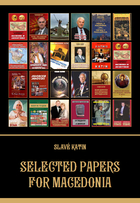 Selected
Papers for Macedonia is a collection of articles by Slave Katin that
were selected by the author and discuss his most common themes. They
cover: Prehistoric Macedonia, The Macedonians in the Diaspora, Immigration
as a Destiny, Macedonians in Australia, Canada and USA, The Religion
of the Macedonians, Well-Known Macedonians in the World, Macedonians
in the Neighbouring Countries, and other topics. This is a large collection
of papers by the author and highlight his life-long interest in the
Macedonian people, their history, religion, culture, their continuity
and national identity, their role in world civilization, and the historical
abuse they have experienced. The book is Here.
A similar and related book, Izbor na Trudovi, contains a large selection
of articles in Macedonian. Along with his historical, religious and
biographical themes, it includes many of the author's travel stories.
This book is Here.
Selected
Papers for Macedonia is a collection of articles by Slave Katin that
were selected by the author and discuss his most common themes. They
cover: Prehistoric Macedonia, The Macedonians in the Diaspora, Immigration
as a Destiny, Macedonians in Australia, Canada and USA, The Religion
of the Macedonians, Well-Known Macedonians in the World, Macedonians
in the Neighbouring Countries, and other topics. This is a large collection
of papers by the author and highlight his life-long interest in the
Macedonian people, their history, religion, culture, their continuity
and national identity, their role in world civilization, and the historical
abuse they have experienced. The book is Here.
A similar and related book, Izbor na Trudovi, contains a large selection
of articles in Macedonian. Along with his historical, religious and
biographical themes, it includes many of the author's travel stories.
This book is Here.
Many Uprisings in the Macedonian Struggle for Independence
 In
his book The Macedonian Struggle for Independence, author Risto Stefov
says that Macedonia has been invaded and occupied many times and so
for a long time the Macedonian people have been struggling to free themselves.
This book looks at the many uprisings by the Macedonian people. Among
them are: uprisings against Byzantine rule, the Hrs, Strez and Dragota
Uprisings, early uprisings against Ottoman rule, and a long list of
uprisings in Karposh, Negush, Razlovtsi, Kumanovo-Kriva Palanka, Pijanets,
Kreshna, Smilevo, Krushevo, Kichevo, Karbunitsa, Dushegubitsa, Gjavato,
Demit Hisar, Prilep, Margara, Ohrid, Resen, Kostur, Lerin, Skopje, Strumitsa
and many more. The book is Here.
The Macedonian version, Makedonskata Borba za Nezavisnost, is Here.
In
his book The Macedonian Struggle for Independence, author Risto Stefov
says that Macedonia has been invaded and occupied many times and so
for a long time the Macedonian people have been struggling to free themselves.
This book looks at the many uprisings by the Macedonian people. Among
them are: uprisings against Byzantine rule, the Hrs, Strez and Dragota
Uprisings, early uprisings against Ottoman rule, and a long list of
uprisings in Karposh, Negush, Razlovtsi, Kumanovo-Kriva Palanka, Pijanets,
Kreshna, Smilevo, Krushevo, Kichevo, Karbunitsa, Dushegubitsa, Gjavato,
Demit Hisar, Prilep, Margara, Ohrid, Resen, Kostur, Lerin, Skopje, Strumitsa
and many more. The book is Here.
The Macedonian version, Makedonskata Borba za Nezavisnost, is Here.
Rula A Macedonian Village and the Journey of Goche
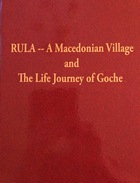 Rula
A Macedonian Village and the Journey of Goche by George Nitsou (Goche
Nichov) is about the author's village and his desire leave a record
of his life for his children. Rula is located on the main between Lerin
and Kostur in Aegean Macedonia. The author says it was once a thriving
and prosperous village with 700 inhabitants. But now less than 10 people
remain. The book discusses the village's dialect, agriculture, traditions,
history and politics. There are also extensive lists of the village's
families and inhabitants, and many photos. The author hopes the book
will give the reader a sense of the beautiful memories and daunting
challenges that the Ruleni faced. The book is Here.
Rula
A Macedonian Village and the Journey of Goche by George Nitsou (Goche
Nichov) is about the author's village and his desire leave a record
of his life for his children. Rula is located on the main between Lerin
and Kostur in Aegean Macedonia. The author says it was once a thriving
and prosperous village with 700 inhabitants. But now less than 10 people
remain. The book discusses the village's dialect, agriculture, traditions,
history and politics. There are also extensive lists of the village's
families and inhabitants, and many photos. The author hopes the book
will give the reader a sense of the beautiful memories and daunting
challenges that the Ruleni faced. The book is Here.
Names from Bronze Age Europe Identified as Slavic but Labeled Ancient
Greek
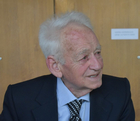 A
basic list of the names of animals, birds, insects and reptiles from
bronze age Europe that are labeled as Greek but are Slavic or proto-Slavic
are in a paper by Professor Kosta Peev and Odyssey Belchevsky. The paper,
titled Names from Bronze Age Europe Identified as Slavic, Labeled Ancient
Greek, but Etymologically not Greek A Linguistic Challenge, has a
Slavic to Greek comparison of the words and says that none of the names
have any significant roots in Greek. They say it also shows the neglect
of the Proto Slavic presence in language. The paper is Here.
A
basic list of the names of animals, birds, insects and reptiles from
bronze age Europe that are labeled as Greek but are Slavic or proto-Slavic
are in a paper by Professor Kosta Peev and Odyssey Belchevsky. The paper,
titled Names from Bronze Age Europe Identified as Slavic, Labeled Ancient
Greek, but Etymologically not Greek A Linguistic Challenge, has a
Slavic to Greek comparison of the words and says that none of the names
have any significant roots in Greek. They say it also shows the neglect
of the Proto Slavic presence in language. The paper is Here.
Code-switching, lexico-grammatical features and loan translation
by Macedonian-English speakers
 The
paper Code-switching, lexico-grammatical features and loan translation:
data from a large Macedonian-English corpus by Jim Hlavac looks at the
speech of 103 bilingual Macedonian-Australians. The paper has many examples
of Macedonians, the vast majority of whom are speakers of south-western
dialects from the Lerin, Kostur and Drama regions and from the Bitola
region, who mix Macedonian and English words and parts of words. The
focuses is on code-switching in a lexical sense, that is, embedding,
insertion, alternation, and referring to lexical material that is transferred
across languages. These usages are investigated, especially the role
of light-verb constructions and lexico-grammatical and lexico-semantic
influence via loan translation. The paper is Here.
The
paper Code-switching, lexico-grammatical features and loan translation:
data from a large Macedonian-English corpus by Jim Hlavac looks at the
speech of 103 bilingual Macedonian-Australians. The paper has many examples
of Macedonians, the vast majority of whom are speakers of south-western
dialects from the Lerin, Kostur and Drama regions and from the Bitola
region, who mix Macedonian and English words and parts of words. The
focuses is on code-switching in a lexical sense, that is, embedding,
insertion, alternation, and referring to lexical material that is transferred
across languages. These usages are investigated, especially the role
of light-verb constructions and lexico-grammatical and lexico-semantic
influence via loan translation. The paper is Here.
Macedonia: A Nation at a Crossroads
 The
895 page book Macedonia: A Nation at a Crossroads contains a collection
of 48 articles by author, Sam Vaknin. Mr Vaknin was for many years a
prolific commentator on Macedonia's international and domestic political
and economic affairs. His articles cover a wide variety of topics with
this collection having a focus on economics, economic policy and business.
There are also interviews with leading economic leaders in Macedonia.
Among his many professional roles, Mr Vaknin was Economic Advisor to
the Government of the Republic of Macedonia and to the Ministry of Finance
between 1999 to 2002, and between 2001 to 2003 he was Senior Business
Correspondent for United Press International. The book is Here.
The
895 page book Macedonia: A Nation at a Crossroads contains a collection
of 48 articles by author, Sam Vaknin. Mr Vaknin was for many years a
prolific commentator on Macedonia's international and domestic political
and economic affairs. His articles cover a wide variety of topics with
this collection having a focus on economics, economic policy and business.
There are also interviews with leading economic leaders in Macedonia.
Among his many professional roles, Mr Vaknin was Economic Advisor to
the Government of the Republic of Macedonia and to the Ministry of Finance
between 1999 to 2002, and between 2001 to 2003 he was Senior Business
Correspondent for United Press International. The book is Here.
Zelnik, Zbog and the Gods
 The
article Zelnik, Zbog and the Gods by Chris Christou is a tribute to
one of Macedonia's favorite foods. The article is about the history
of zelnick, its role and cultural contribution to Macedonian village
and family life, and its relationship with burek. The article also looks
at the position that variations of zelnick and burek have as traditional
foods in the history and spiritual values of other cultures. Mr Christou
is a Canadian based culture activist, writer, and podcaster whose background
is from Aegean Macedonia. The article is Here.
Mr Christou's web site is Here.
The
article Zelnik, Zbog and the Gods by Chris Christou is a tribute to
one of Macedonia's favorite foods. The article is about the history
of zelnick, its role and cultural contribution to Macedonian village
and family life, and its relationship with burek. The article also looks
at the position that variations of zelnick and burek have as traditional
foods in the history and spiritual values of other cultures. Mr Christou
is a Canadian based culture activist, writer, and podcaster whose background
is from Aegean Macedonia. The article is Here.
Mr Christou's web site is Here.
The Little Book of Big Greek Lies now in Macedonian
The book The Little Book of Big Greek Lies by Risto Stefov is now
available in Macedonian. Malata Kniga na Golemite Grchki Lagi examines
and debunks many of the most common Greek propaganda lines. Among them,
that modern Greeks are direct descendants of the ancient Greeks, that
the ancient Greek gods' were Greek, that there is no such thing as
a Macedonian, that Greece is an ethnically homogeneous nation, that
Macedonia is Greek, that no Macedonians, Turks, Albanians or Vlachs
live in Greece today, that the Macedonian monks Kiril and Metodi were
Greek, that Macedonians are Slavs, that the Ancient Macedonians were
Greek, that Philip II united the Greeks, and that Macedonia was liberated
in 1912, 1913, among others. The book is Here.
The English language version is Here.
Otsiron's Rise to Power (Part 5)
The fifth and final part of the novel The Alien that Changed the
World Otsiron's Rise to Power by Risto Stefov is now available. The
author says that the fictional adventure story has a Macedonian twist
as the main character is a Macedonian who shares his pain with others
in similar situations. Part 5 is Here.
The other parts are here: Part
1, Part
2, Part
3, Part
4.
Books by Other Publishers
Lakes and Empires in Macedonian History
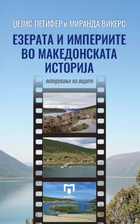 The
book Lakes and Empires in Macedonian History Contesting the Waters
by James Pettifer and Miranda Vickers is now available in Macedonian.
The book tells the story of Psarades, Nivitsi in Macedonian, a lakeside
village on the Greek side of Lake Prespa. The authors explore the social,
cultural and political history of the village and the wider region and
say it embodies the many contradictions of modern history. The book
looks at how the development of international borders, the movement
of people and the role of national identities have shaped Macedonia
today. It also has the first environmental history of this multi-ethnic
borderland region shared by Greece, Macedonia and Albania. The book
can be purchased Here.
The English version can be purchased Here.
The
book Lakes and Empires in Macedonian History Contesting the Waters
by James Pettifer and Miranda Vickers is now available in Macedonian.
The book tells the story of Psarades, Nivitsi in Macedonian, a lakeside
village on the Greek side of Lake Prespa. The authors explore the social,
cultural and political history of the village and the wider region and
say it embodies the many contradictions of modern history. The book
looks at how the development of international borders, the movement
of people and the role of national identities have shaped Macedonia
today. It also has the first environmental history of this multi-ethnic
borderland region shared by Greece, Macedonia and Albania. The book
can be purchased Here.
The English version can be purchased Here.
More Free Ebooks
There are now over 500 free ebooks in The
Pollitecon Free Ebooks Library.
Macedonia Needs Macedonians

Please remember that Macedonia Needs Macedonians. The Facebook page
for the Macedonia Needs Macedonians group is Here.
Two major tourism portals are Travel2Macedonia which is Here,
and Macedonia - Timeless which is Here.
Canadian Macedonian Books
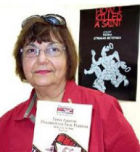 A
reminder that Canadian Macedonian Books has a great selection of Macedonian
books in English from around the world. These include non-fiction, fiction,
children's and cook books. Canadian Macedonian Books is run by Virginia
Evans, a former co-president of the Canadian Macedonian Historical Society
and founder of the Macedonian Film Festival in Toronto. Canadian Macedonian
Books is Here.
A
reminder that Canadian Macedonian Books has a great selection of Macedonian
books in English from around the world. These include non-fiction, fiction,
children's and cook books. Canadian Macedonian Books is run by Virginia
Evans, a former co-president of the Canadian Macedonian Historical Society
and founder of the Macedonian Film Festival in Toronto. Canadian Macedonian
Books is Here.
Sign
up to receive Pollitecon Updates
Thank you
Victor Bivell
Pollitecon Publications
PO Box 3411
Wareemba NSW 2046 Australia
Email vbivell @ pollitecon.com
Web http://www.pollitecon.com
More Updates

